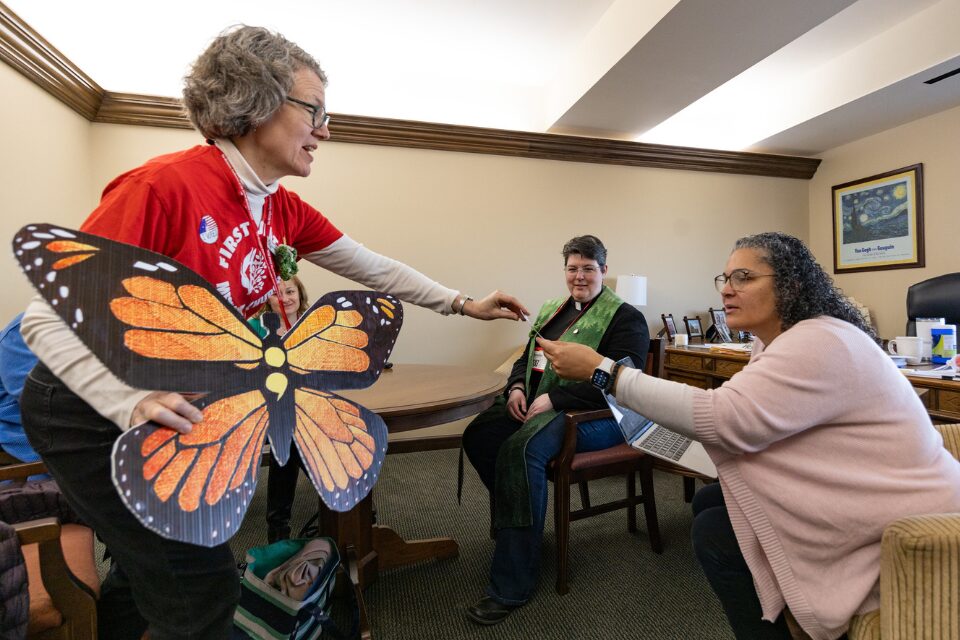Through courageous witness, 250 United Methodists and friends journeyed to the State Capitol to tell their stories and champion mental health care access for all Michiganders.
JAMES DEATON
Content Editor
On March 13, 2024, tenth-grader Delia Hoffman traveled to the State Capitol with her father and youth pastor to meet legislators and advocate for better access to mental health care in Michigan. She takes this matter seriously and believes more can be done in our state.
A member of Clarkston United Methodist Church, Delia wanted to tell her own story, but she also carried the stories of friends she cared about in her heart.
“I’ve been passionate about mental health since I learned about it during COVID,” she said. “Me and a lot of my friends struggled so much with our mental health, with depression and anxiety. So, it’s really important to me that people pay attention to it and care about it.”
Mental health care access was the focus of Advocacy Day 2024, sponsored by the Michigan Conference of The United Methodist Church. This topic inspired Delia to go to Lansing and share her story with lawmakers to encourage them to vote in support of key legislation that would improve mental health care access for all Michiganders and save lives.
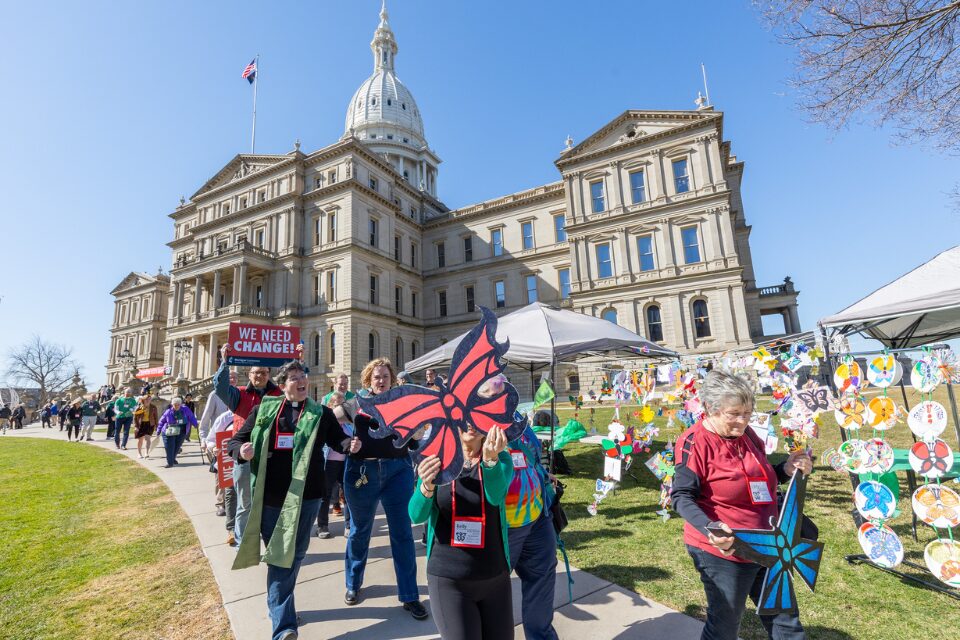
Delia joined over two hundred United Methodists and friends for the Michigan Conference’s second Advocacy Day. People came from across the state, from diverse congregations and ministry settings, as far away as Marquette in the Upper Peninsula. Following last year’s powerful witness related to gun violence prevention, people of faith stepped up to champion better mental health care for Michigan’s most vulnerable populations.
Central United Methodist Church, across the street from the Capitol building, hosted the event, providing space for worship, planning meetings, and other Advocacy Day activities. Attendees arranged 421 homemade semicolon butterflies on the Capitol lawn, with each butterfly representing 1,000 Michiganders who did not receive needed mental health care in 2020.
Jason Milligan, a high school math teacher from Midland: First United Methodist Church, heard the announcement at church and felt moved to participate because of the ongoing mental health needs he sees every day at his school.
Since COVID, the heightened need for mental health services has been very present, with some students requiring inpatient care. However, accessibility and affordability are often roadblocks.
“A lot of the families that I work with have middle-of-the-road insurance, and it may not cover the level of service they need,” Jason explained. “So, when a student needs to be referred to someone outside the school setting, they’re put on a waitlist that is sometimes one or two months. When a student has a crisis moment, that’s the last thing a family wants to hear.”
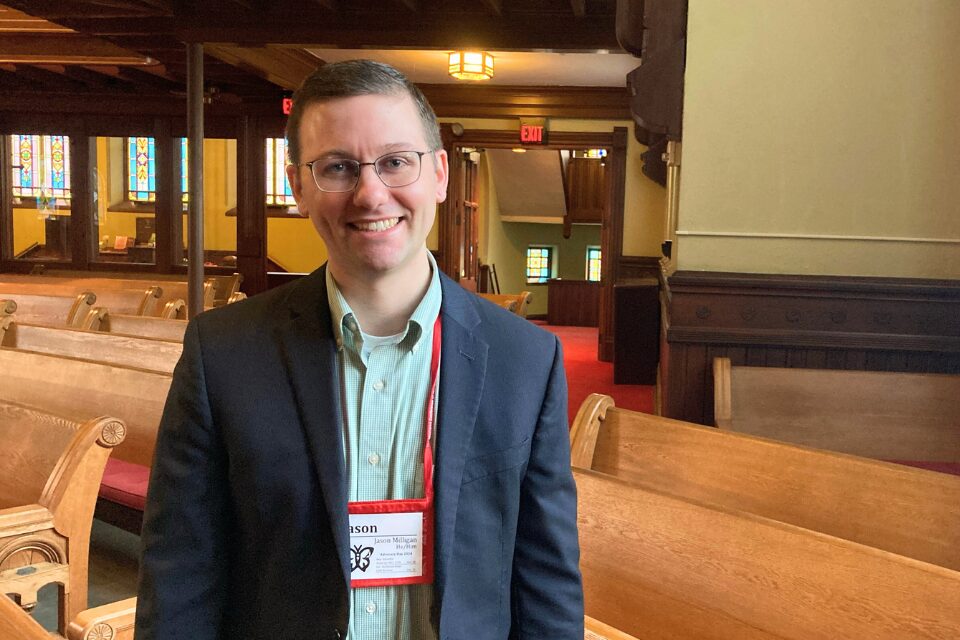
Jason believes the legislative bills Advocacy Day focused on will help remove the bureaucratic red tape preventing the youth he knows from receiving adequate mental health care.
Proposed House Bill (HB) 4707 would increase mental health parity. Insurance companies would be required to cover both mental and physical health according to clinical standards. It would also require insurers to cover out-of-network mental health or substance use disorder services if there are no in-network services available.
HB 5371 and HB 5372 would expand the successful pilots of Certified Community Behavioral Health Clinics (CCBHCs) throughout the state. Michigan has a couple dozen CCBHCs, but they are primarily in urban areas downstate. Services at CCHBCs are available to anyone, regardless of age, residency, ability to pay, insurance coverage, or severity of the mental illness. They enable people to start receiving care even before they are in a severe crisis. If people are on a waitlist for a mental health provider, they would be able to begin receiving care at a CCBHC and then transition to that other provider once they’re off the waitlist.
“I think mental health services can truly help people,” said Jason. “I have received mental health care, and it has greatly helped me. So, I believe the bills we’re advocating for will help people get the care they need and be able to pay for it.”
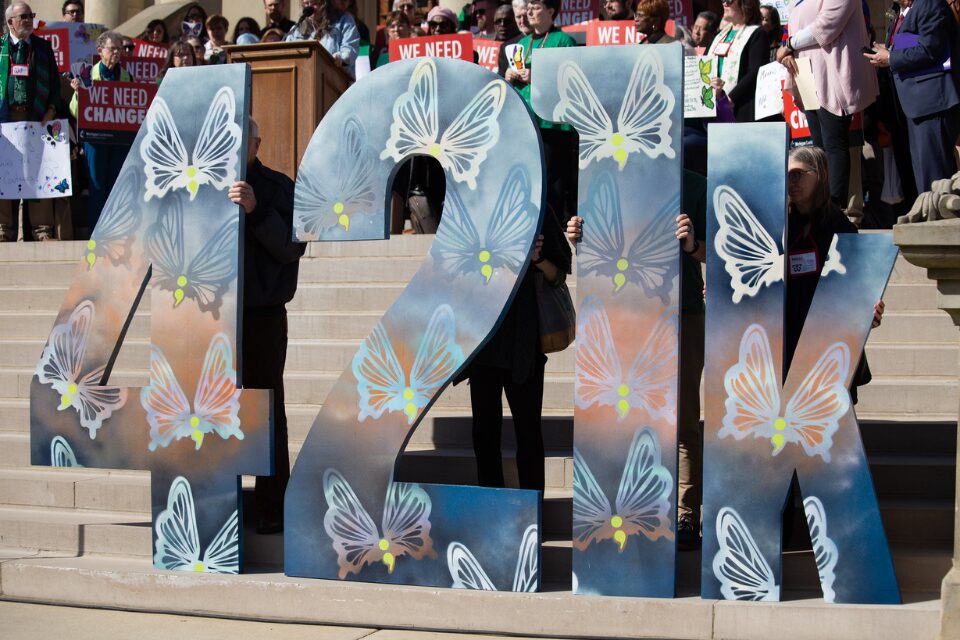
For Delia, mental health is equally important as physical health, and insurance companies should be required to treat them the same way. Plus, there should be ways to help every person when they’re having a mental health crisis, no questions asked, and they shouldn’t have to wait for emergency care.
A couple of Delia’s school friends have been hospitalized because of mental illness, and thankfully, they were able to get treatment before the situation got worse. But that may not be the case for others.
“If we are on top of accessible and affordable mental health care,” she said, “hopefully it would be a lot rarer for people to get to that point [of harming themselves]. Too many people cross that line, and it’s tragic. Also, if we get rid of the stigma, people are going to be more likely to talk about it. And if they talk about it, they’re more likely to get help and less likely to do things that they can’t undo.”
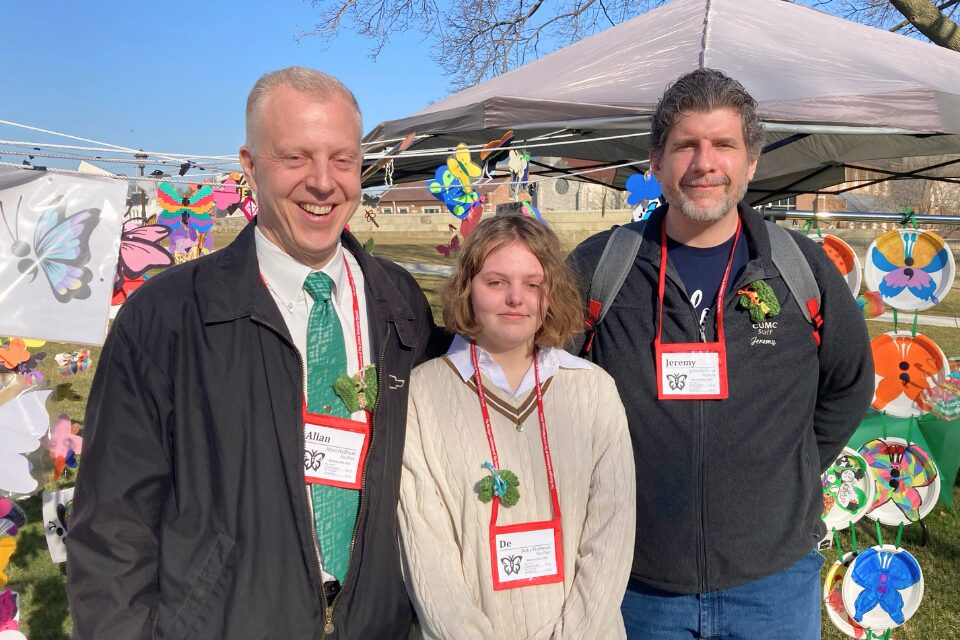
Another goal of this year’s Advocacy Day was eradicating the stigma attached to mental illness and substance use disorder. Unfortunately, the church has not always been the safest place to open up to others about these concerns. But this gathering of faith-filled justice seekers gave attendees the gifts of mutual support through prayer, the strength to stand in public witness on the Capitol steps, and the grace-filled space to share their painful stories and be heard. This, in turn, gave attendees the courage to meet with their legislators and move hearts and minds.
In his remarks during the morning welcome at Central UMC, before everyone headed off to their scheduled meetings with lawmakers, Bishop David Bard quoted Rev. Alice Townley and the Advocacy Day Steering Committee’s goals: “Advocacy Day is for developing connections, capacity, and confidence so that we can continue to be changemakers for the common good.” He expanded this further, “We’re here to increase our connections to one another and for you to connect with the people you have elected into office. And we’re here to help increase our collective confidence in doing this kind of work.” Thus, Advocacy Day affirms one of the Michigan Conference’s strategic goals: building the beloved community.
Exercising these advocacy “muscles,” whether in Lansing or in our local church, will give people some tools for organizing thoughts and having honest conversations with friends and family in church and at home. It will chip away, one conversation at a time, at the stigma that’s unfairly attached to mental illness. Plus, the greater hope is that courageously speaking out on the issue of mental health care access will lead to speaking out on behalf of other issues.
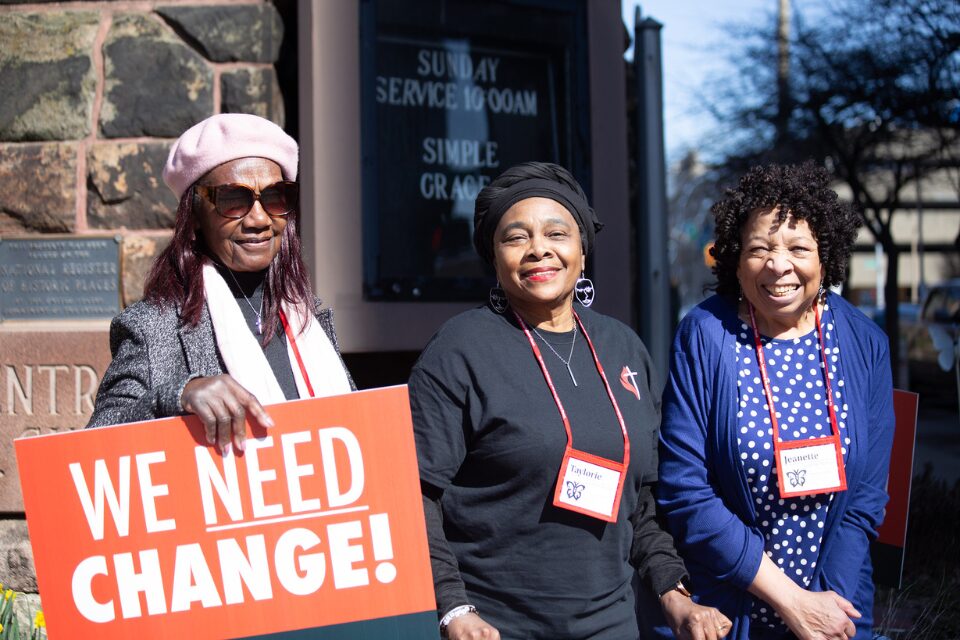
Ruth Ann Church, a member of First United Methodist Church of Ann Arbor, admits that advocacy is part of her DNA as a United Methodist. She’s proud of The United Methodist Church for being at the forefront of social change, whether it’s anti-racism, safe workplaces, women’s rights, LGBTQIA+ inclusion, or other issues. “Mental health care access is one more of those issues where the church can be a beacon to those who are marginalized and vulnerable.”
She came to Advocacy Day to speak to her legislators on behalf of a beloved cousin who died by suicide due to inadequate mental health care. Ruth Ann’s cousin struggled with mental illness and sought help but was turned away due to a lack of beds. She eventually ended up in a facility that her parents described as traumatic.
“To this day, my cousin’s parents say Michigan’s mental health system is broken,” Ruth Ann said. “The whole system and how it’s all connected is a hydra, a puzzle, and there’s no one magic bullet. I know more hospital beds aren’t going to solve the problem. We really need HB 4707, which gives parity, and we need Certified Community Behavioral Health Clinics as an ideal first stop. If these laws had been in place, maybe my cousin would’ve gotten the care she needed before it became a suicidal crisis. And even if it had gotten to a crisis, maybe her parents would’ve had an easier time accessing the best care for their daughter.”
She continued, “Now I understand why these bills are great next steps. Yes, Michigan, let’s start addressing this problem with seriousness by passing them and moving on to the next step.”
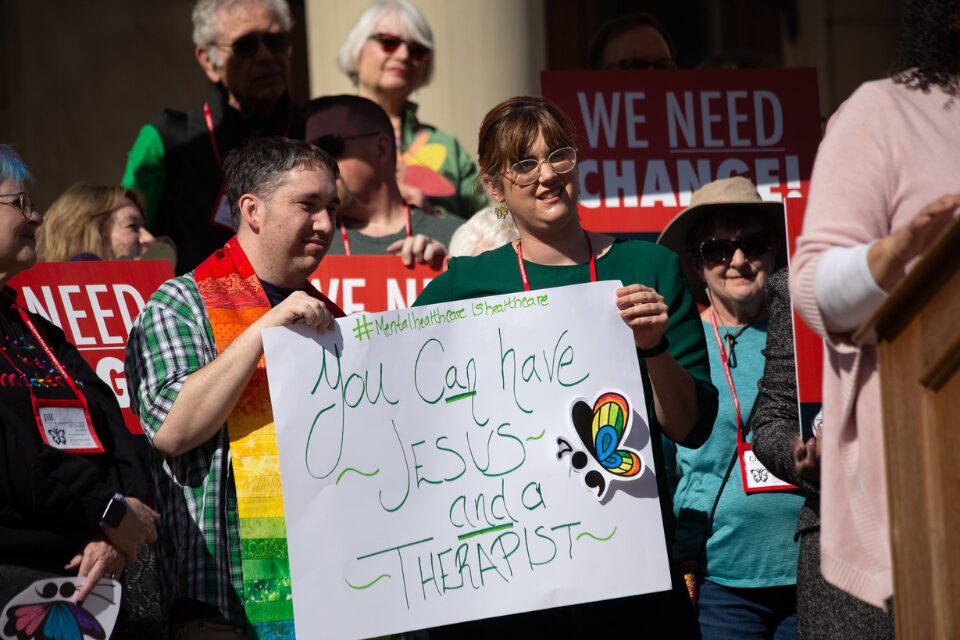
Another “stretch goal” that some Advocacy Day participants asked for when conversations with legislators went well was increased funding in the state budget for a full menu of complementary care, including the number of inpatient psychiatric beds and step-down levels of care.
For Joe Cohee, an emergency room nurse from Sault Ste. Marie, who is temporarily working as a travel nurse in the Grand Rapids area, increased funding for mental health services is a big part of what is desperately needed for people back home in the Upper Peninsula.
The three bills currently in committee are important, and Joe is advocating for them first. The parity bill would help people with insurance plans that don’t fully cover mental health care. “I’ve had clients,” he said, “that have had divorces, at least on paper, because their insurance would not cover mental health care. But if they were on Medicaid or Medicare, it would.”
CCBHCs and other similar facilities that would help people get immediate care in crisis situations should be available in places farther north. Rural areas, especially those in the Upper Peninsula, need this level of care, for mental illness knows no geographic boundaries.
“A lot of patients cannot get help to prevent them from going into crisis,” he said. “So, if they were able actually to see counselors, these services would hopefully prevent them from harming themselves and ending up in my ER.”
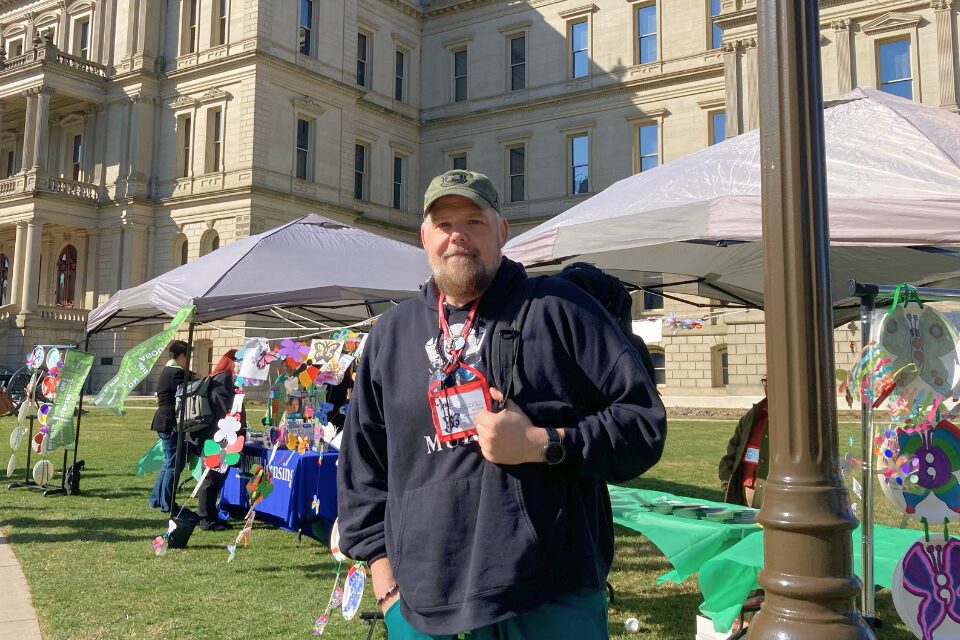
Joe says a great next step would be increased funding in the state budget for more beds and facilities in the Upper Peninsula to address the dire situation he witnesses there. “I can tell you as an ER director,” he explained, “that I’ve had mental health patients sitting in my ER for two to three weeks trying to find a bed. I’ve had to send children all the way to Wisconsin because they’ve sat in my ER for a month. There are no pediatric facilities in the UP. And I’ve had to put heart attack patients on a cot in the hallway because I have no vents. I’m bottlenecked.”
The need for more psychiatric facilities in rural parts of Michigan is also a real concern for Amy Burstall. Amy is the wife of Rev. Rich Burstall, pastor of Central United Methodist in Lansing.
Amy found out a couple of years ago that her younger daughter, who lives in Sault Ste. Marie, is clinically schizophrenic. Amy took her to the hospital during an initial episode but ran into complications quickly. There is only one inpatient psychiatric facility in the Upper Peninsula, and there weren’t any beds open at the moment, so Amy had to sit with her daughter in the ER, waiting for a bed to become available.
“My daughter was sitting there spiraling, and it was horrific for me as the parent to see,” Amy confessed. “She was treated very well at the hospital in Sault Ste. Marie, but it was very frustrating waiting with her, knowing that she could be getting treatment now, but there’s nowhere for her to go.”
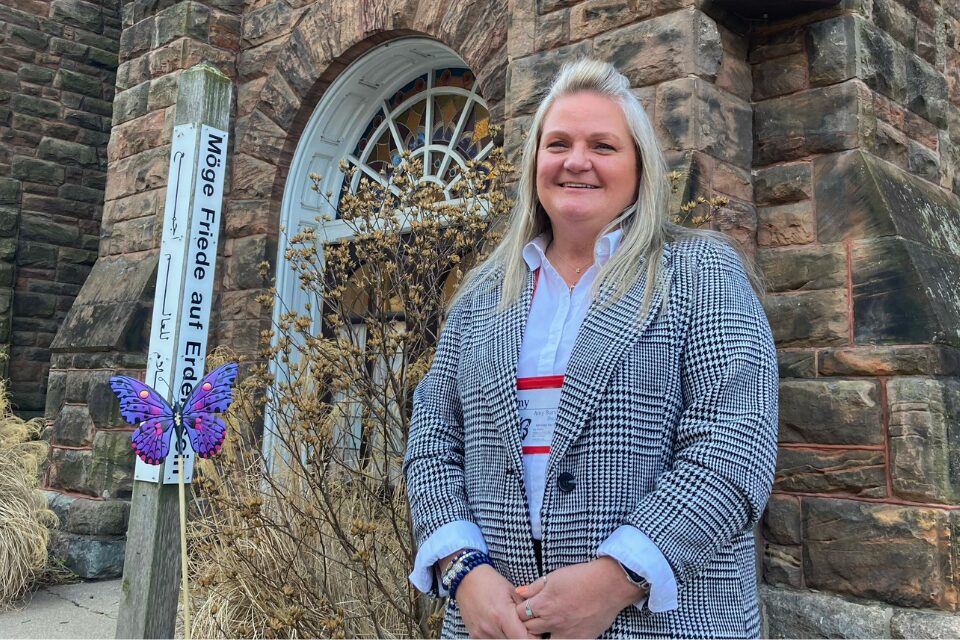
Eventually, Amy’s daughter got the care she needed. Thankfully, she is doing well now and can manage her illness by taking her medication and going to therapy. However, the need for increased funding for more mental health services and staffing in rural parts of Michigan is an ongoing concern. And people of faith are continuing to speak out for better services.
As Christians, we believe God desires the health and wholeness of every human being. We are created by God and born to be in relationship with others. We also follow in the footsteps of Jesus, who ministered with love and compassion to all, especially those stigmatized by society.
Our United Methodist beliefs also inform how we live out our faith. In “Ministries in Mental Illness” (3033), a United Methodist resolution that has been adopted by every General Conference since 1992, communities of faith are called to become “Caring Communities” and respond to mental illness through advocacy: “Congregations not only advocate for specific individuals caught up in bureaucratic difficulties, but identify and speak out on issues affecting persons with mental illness and their families that are amenable to legislative remedy” (3303.2).
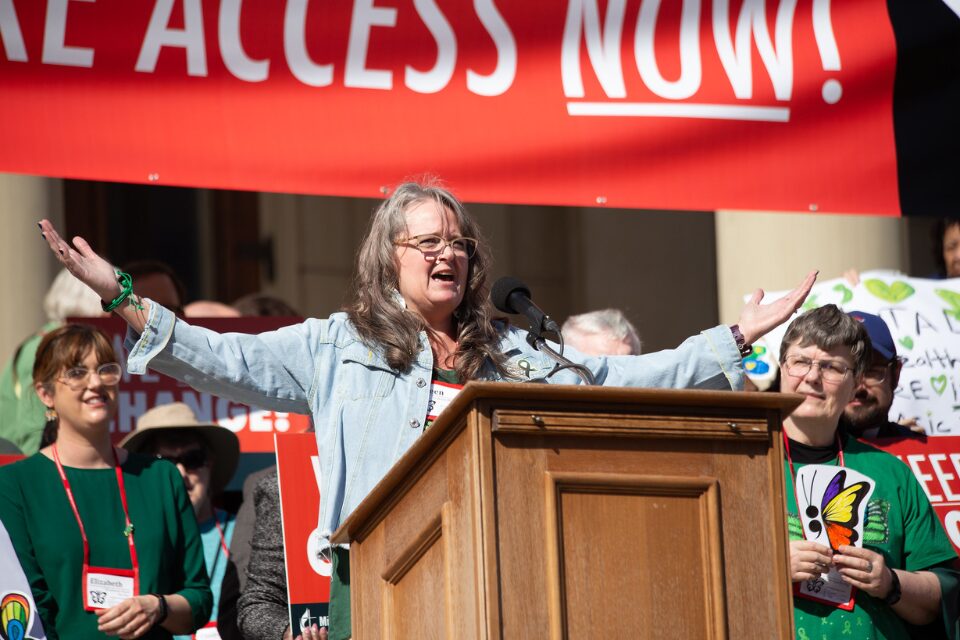
Michigan United Methodists and friends pray and hope their meetings with legislators impacted their decision-making on the three bills and increased funding in the state budget, which will improve the mental health care of the most vulnerable populations in our state. On Advocacy Day, 79 out of 110 House of Representative districts and 36 out of 38 Senate districts were represented. When the representative or senator was unavailable, Advocacy Day justice seekers either spoke with one of their staff members or dropped off letters of support.
Time and again, Advocacy Day attendees heard that personal storytelling is what moves people the most on issues. And there is great witness and power in storytelling as an act of faith.
Jeremy Dean, Delia Hoffman’s youth pastor at Clarkston United Methodist Church, wanted to make sure Delia and the other youth in Clarkston’s Leadership Institute understood the impact we can have through our storytelling and witness as they discussed the topic for Advocacy Day this winter. This program is for the congregation’s tenth and eleventh-grade high school students, and the focus changes each year and has included faith, love, diversity, and advocacy.
He explained further, “We had a Leadership Institute this year to tell our students in high school that you can make a difference all throughout your life. We can make a difference, one voice at a time. We can change the world. And I think Christ calls us to do that. And it seems like a daunting task and sometimes impossible, but it’s real. If we have the Holy Spirit with us and we share our stories and go do things like Advocacy Day, it’s not that hard.”
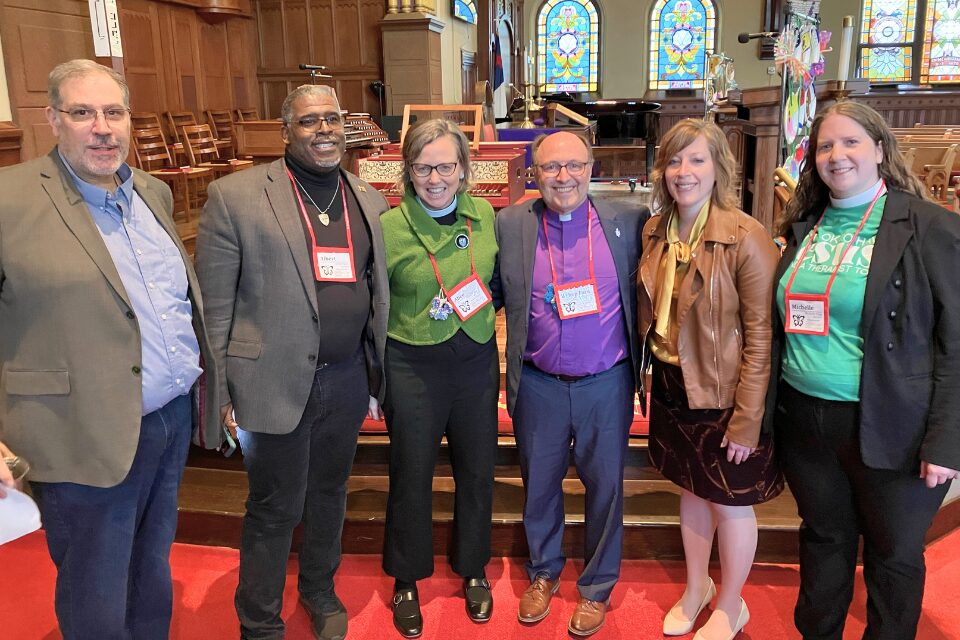
In his sermon during the closing afternoon worship service, Bishop Bard lifted up the message of our individual voices in witness with the image of the butterfly, which became the rallying symbol for Advocacy Day 2024, symbolizing strength, perseverance, and hope.
“Today, we have spread our wings,” he said. “We have offered healing wings, figuratively and tangibly. And let’s trust that by the grace of God and in the power of the Spirit, there is something of the butterfly effect in our work. The butterfly effect is imagined as the butterfly flapping its wings in the Amazonian jungle and, subsequently, a storm ravages Europe. It is only an image, but the “butterfly effect” phenomenon is real. Small acts may have a significant impact. Perhaps one semicolon seen today, letting someone know that the story of their life goes on, has made a big difference to them. Perhaps one conversation with a legislator has opened them up to new thinking. Perhaps one contact with an aid has given them new hope or helped them see the church in a new light. We’ve surrounded ourselves with butterflies today and sought to be people through whom the healing wings of the Spirit have touched the world.”
Last Updated on March 26, 2024

